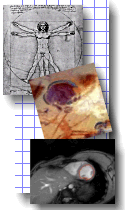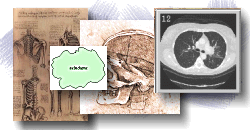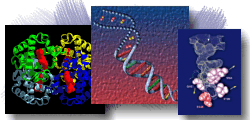 |
| This page contains a brief overview of UCLA's KMeD research
project. Read it to get a general idea of what KMeD is and
what it aims to achieve. |
 |
 |
|
The objectives of the Knowledge-Based Multimedia Medical
Distributed Database System (KMeD) are to: |
 |
- Query medical multimedia distributed databases by both image and alphanumeric
content,
- Model the temporal, spatial, and evolutionary nature
of medical objects,
- Formulate queries using conceptual and
imprecise medical terms and support cooperative
processing,
- Develop a domain-independent, high-level query language and
a medical domain user interface to support KMeD functionality,
and
- Provide analysis and presentation methods for visualization
of knowledge and data models.
|
 |
|
 |
  |
 |
The database is represented by features and objects.
Using rules derived from application and domain knowledge,
approximate and conceptual queries may be
answered. Additional information relevant
to a query may be provided by associating
different hierarchies of subjects.
Type abstraction hierarchies (TAHs) generalize
a query's scope while relaxation control, based on user profiles
and query context, trims the TAHs, keeping the generalizations
manageable and appropriate.
An explanation system details the relaxation path
and the nearness of the approximate answer to the exact one. |
|
 |
 |
|
These concepts are validated in a testbed linked with
radiology image databases. The joint research
between the
UCLA Computer Science Department
and the School of Medicine assures that
the prototype system is of
direct interest to medical research and practice. The
results of this research are extensible to other
multimedia database applications. |
 |
|
 |
